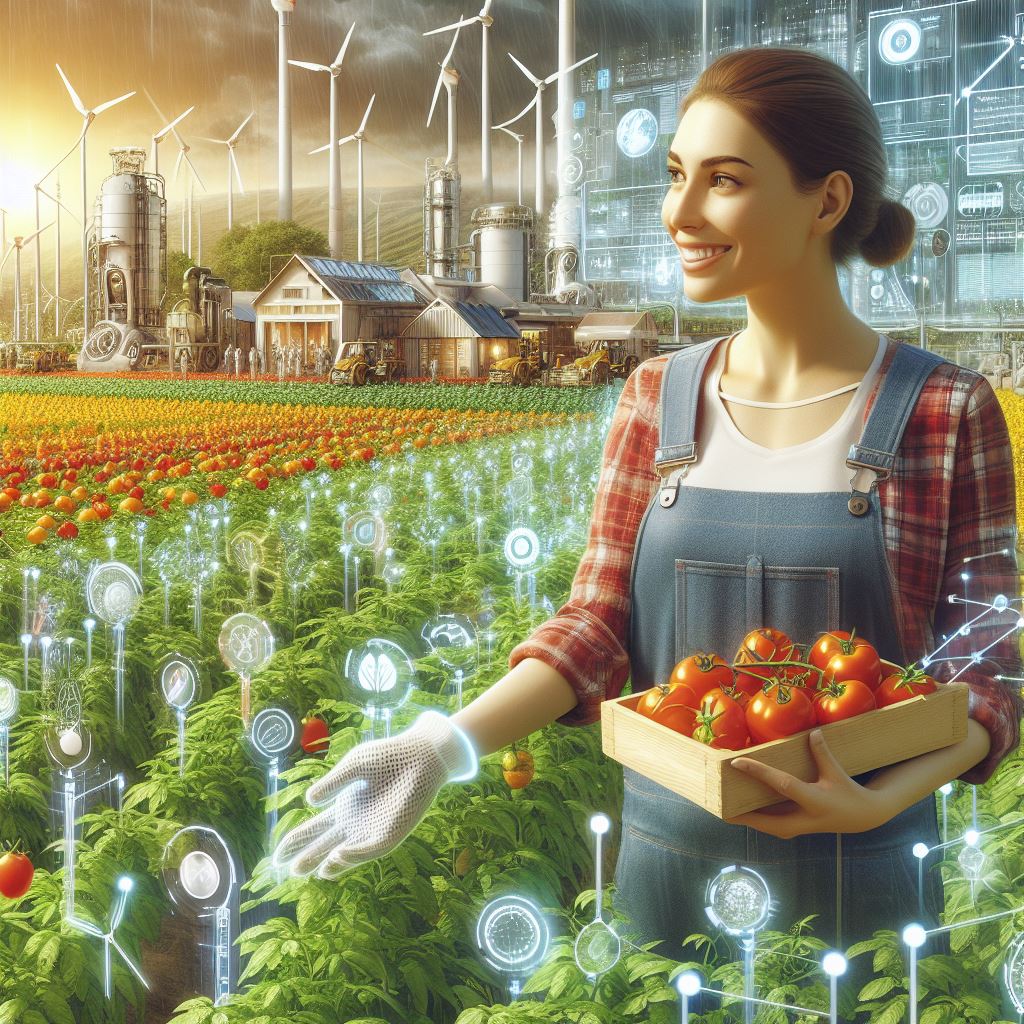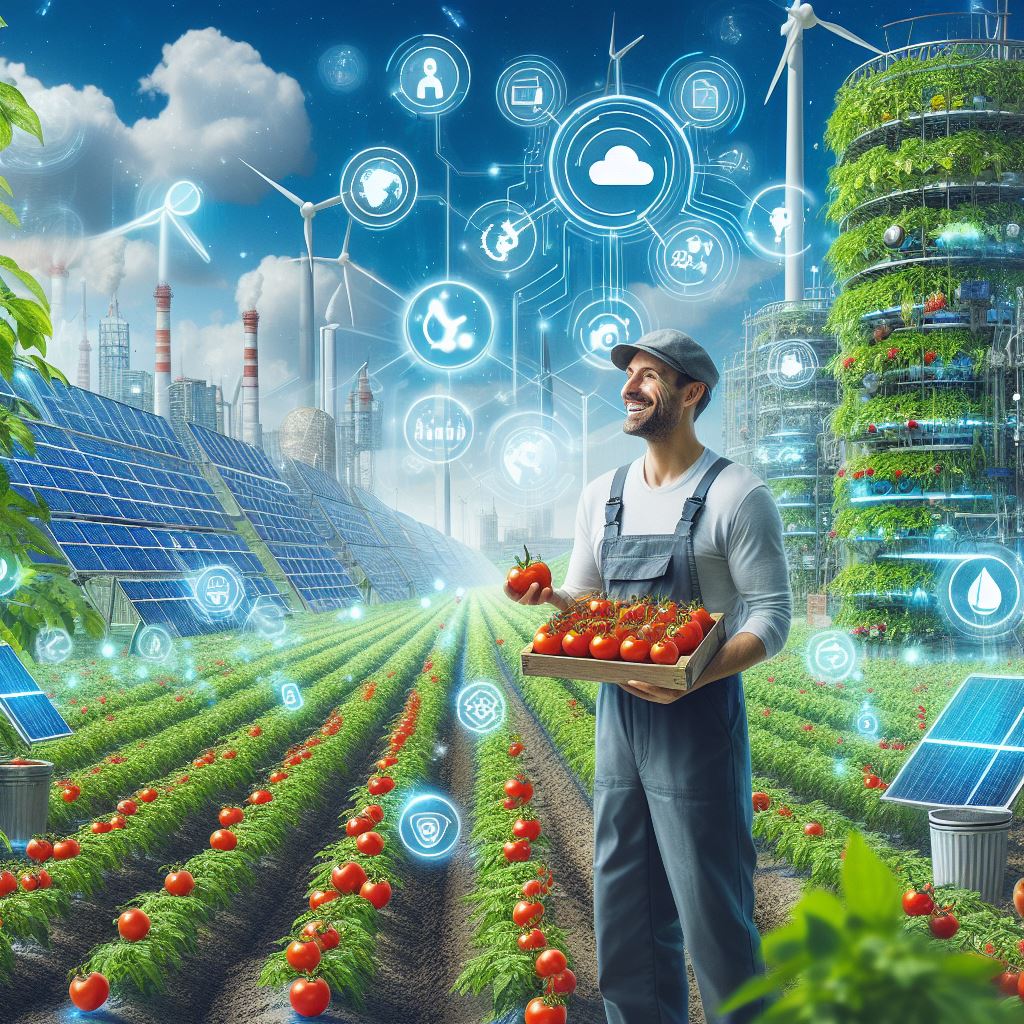Introduction
Welcome to the future of farming! In our exploration of Agri-Tech: Revolutionizing Crop Management, we dive into the groundbreaking innovations shaping the agricultural landscape.
Agri-Tech and its significance in crop management.
This is the application of technology in agriculture to enhance crop management.
Agri-Tech revolutionizes crop management, integrating advanced technologies like precision agriculture, drones, and data analytics.
This synergy optimizes resource use, enhances crop yields, and ensures sustainable practices.
The marriage of agriculture and technology heralds a future where innovation meets efficiency in cultivating our food supply.
Importance of adopting technology in agriculture to increase efficiency and productivity.
Adopting technology in agriculture is paramount for heightened efficiency and productivity.
Innovations like precision farming, automated machinery, and data analytics empower farmers with real-time insights, enhancing decision-making.
Embracing technology not only streamlines processes but also ensures sustainable, high-yield agricultural practices.
It plays a vital role in increasing efficiency and productivity in farming. Adopting technology in agriculture is of utmost importance.
Benefits of Agri-Tech in Crop Management
Improved data collection and analysis
In the world of agriculture, technology has revolutionized the way that farmers manage their crops.
Through the use of sensors, drones, and satellite technology, data collection and analysis in crop management have reached new heights.
By using sensors, farmers can monitor various aspects of their crops such as soil moisture, temperature, and nutrient levels.
Drones equipped with high-resolution cameras can capture detailed images of fields, allowing farmers to spot any signs of disease or stress in their crops.
Satellite technology provides farmers with valuable data on weather conditions, helping them make informed decisions regarding irrigation and pest control.
This wealth of data is then analyzed to provide farmers with insights into crop performance and overall farm management.
Transform Your Agribusiness
Unlock your farm's potential with expert advice tailored to your needs. Get actionable steps that drive real results.
Get StartedBy understanding the patterns and trends in the data, farmers can make better decisions on when to plant, irrigate, and harvest their crops.
They can also identify areas for improvement, such as adjusting fertilizer application rates or implementing pest management strategies.
Precision agriculture
Precision agriculture is a farming approach that utilizes advanced technologies to optimize crop production.
GPS systems and variable rate technology play a crucial role in precision agriculture.
With GPS systems, farmers can precisely track their equipment and navigate their fields with accuracy.
This enables them to effectively plan and execute field operations, such as planting and spraying, while minimizing overlaps or gaps.
Variable rate technology allows farmers to adjust input application rates, such as fertilizers or pesticides, based on the specific needs of different areas within a field.
Site-specific crop management is another key aspect of precision agriculture.
By thoroughly analyzing the data collected, farmers can identify variations in soil fertility, moisture levels, and other factors within their fields.
This enables them to tailor their management practices to specific areas, optimizing resource allocation and minimizing input costs.
Enhancing yield and quality
Agri-Tech innovations have significantly contributed to enhancing crop yield and quality.
Genetic engineering, for example, has allowed scientists to develop crop varieties that are more resistant to pests, diseases, and adverse environmental conditions.
Automated irrigation systems have also played a crucial role in increasing crop yields.
These systems monitor soil moisture levels and automatically adjust irrigation schedules, delivering water precisely when and where it is needed.
Precision application of fertilizers and pesticides further improves crop quality.
By applying these inputs only where necessary, farmers can reduce waste and minimize environmental impact.
This targeted approach ensures that crops receive the optimal amount of nutrients and protection, resulting in higher-quality produce.
Overall, Agri-Tech offers numerous benefits in crop management. Improved data collection and analysis enable farmers to make more informed decisions, while precision agriculture maximizes crop production and efficiency.
Agri-Tech innovations also enhance crop yield and quality, contributing to sustainable and profitable farming practices. With technology continuing to advance, the future of crop management looks promising.
Read: Agri Startups: Innovation and Growth
Challenges in Adopting Agri-Tech
Adopting Agri-Tech solutions in agriculture holds immense potential for revolutionizing crop management.
However, several challenges hinder the widespread implementation of these technologies.
In this section, we will delve into the various obstacles faced by farmers in adopting Agri-Tech and explore the possible solutions to overcome them.
Cost and accessibility
One of the major hurdles in embracing Agri-Tech is the financial constraints faced by farmers.
Showcase Your Farming Business
Publish your professional farming services profile on our blog for a one-time fee of $200 and reach a dedicated audience of farmers and agribusiness owners.
Publish Your ProfileThe initial investment required for purchasing advanced technological equipment and infrastructure can be prohibitively expensive for small-scale farmers.
This cost factor restricts their ability to adopt these solutions, limiting their access to the benefits of Agri-Tech.
Moreover, limited availability and affordability of Agri-Tech solutions pose a challenge for farmers.
In many regions, access to these technologies is limited, making it difficult for farmers to procure them.
Additionally, even if available, the high price tags associated with advanced technology may make it unaffordable for farmers with limited resources.
The lack of affordable and accessible Agri-Tech solutions hampers its widespread implementation in agriculture.
To address the financial barriers, governments and agricultural organizations should provide financial assistance and subsidies to farmers for the adoption of Agri-Tech.
This would help in reducing the upfront costs and making the technologies more affordable.
Collaborations between private technology companies and farmers’ associations can also facilitate the development of cost-effective Agri-Tech solutions.
Training and Education
Another challenge in adopting Agri-Tech is the lack of proper training and education for farmers and agricultural professionals.
The successful implementation of technology in agriculture requires a certain level of knowledge and skillset.
Many farmers lack the necessary understanding of Agri-Tech practices, limiting their ability to utilize these technologies effectively.
Educating farmers on the benefits and functionalities of Agri-Tech practices is crucial.
Training programs, workshops, and seminars should be organized to impart the necessary knowledge and skills.
These programs can cover topics like data analytics, remote sensing, precision agriculture, and farm management systems.
By equipping farmers with adequate training, they can maximize the potential of Agri-Tech solutions and enhance their crop management practices.
Technological barriers
The integration of multiple technologies and systems in Agri-Tech poses its own set of challenges.
Compatibility and interoperability issues arise when different technologies are required to work together seamlessly.
Integration problems could arise when implementing various solutions such as sensor networks, drones, and automated machinery.
To overcome technological barriers, standardized protocols and interfaces need to be established to ensure compatibility among different Agri-Tech solutions.
Collaboration among technology providers, researchers, and policymakers is essential in developing common frameworks and standards.
Interoperability testing and certification programs can be implemented to ensure that different technologies work harmoniously.
In general, while Agri-Tech holds immense potential in revolutionizing crop management, several challenges need to be addressed for its widespread adoption.
By addressing the financial constraints, providing adequate training, and resolving technological barriers, farmers can embrace Agri-Tech and unlock its benefits for enhanced agricultural practices.
Read: Efficiency in Agri Supply: Strategies & Tips
Success Stories of Agri-Tech Adoption
Agri-Tech, the integration of technology in agriculture, has been revolutionizing crop management in recent times.
Several farmers have successfully implemented Agri-Tech practices, resulting in increased yields, reduced costs, and improved sustainability.
Let’s explore some inspiring success stories that shed light on the positive outcomes of Agri-Tech adoption.
Examples of farmers who have successfully implemented Agri-Tech practices.
John’s Remarkable Yield Improvement
- John, a small-scale farmer, embraced Agri-Tech to enhance his crop production.
- By leveraging smart irrigation systems and data-driven analysis, he optimized water usage.
- With improved water management and precise nutrient application, John witnessed a remarkable 30% increase in his crop yield.
- Not only did he witness a boost in productivity, but he also managed to reduce water wastage significantly.
Maria’s Cost Reduction Strategies
- Maria, a progressive farmer, adopted Agri-Tech practices to reduce costs and increase profitability.
- She introduced drones equipped with advanced imaging sensors to monitor crop health and detect pest infestations.
- This proactive approach allowed her to identify and address issues at early stages, minimizing the need for expensive pesticide treatments.
- As a result, Maria successfully reduced her overall expenditure on crop protection measures by 25%, leading to improved financial stability.
Samuel’s Sustainable Farming Practices
- Samuel, an environmentally conscious farmer, turned to Agri-Tech for achieving sustainable farming practices.
- He implemented precision agriculture techniques, leveraging sensors and IoT devices to monitor soil moisture and optimize irrigation.
- By utilizing real-time data, Samuel minimized water usage and achieved more precise fertilizer application.
- These efforts not only led to a 20% increase in his crop yield but also ensured minimal impact on the environment.
Emma’s Efficient Crop Monitoring
- Emma, a tech-savvy farmer, adopted Agri-Tech solutions to streamline her crop monitoring process.
- She used remote sensing technologies and satellite imagery to monitor vegetation indices and identify areas of concern.
- This helped her identify crop stress, nutrient deficiencies, and disease outbreaks at an early stage, allowing timely intervention.
- As a result, Emma achieved higher crop quality and reduced the risk of yield loss, ultimately improving her profits.
Lessons Learned
These success stories demonstrate the immense potential of Agri-Tech in revolutionizing crop management.
Farmers can learn valuable lessons from these experiences:
- Embrace innovation: The adoption of Agri-Tech requires an open mindset and willingness to explore new technologies.
- Invest in knowledge: Farmers should invest in understanding the technological tools and practices available to make informed decisions.
- Start small: It’s advisable to start with a few Agri-Tech solutions and gradually expand based on their effectiveness and impact.
- Combine expertise: Collaborating with Agri-Tech experts and seeking advice from experienced farmers can enhance the chances of success.
- Adapt and iterate: Flexibility and the ability to learn from failures are critical in harnessing the full potential of Agri-Tech.
Furthermore, By embracing Agri-Tech practices, farmers can overcome challenges, improve productivity, and ensure a sustainable future for agriculture.
The success stories of John, Maria, Samuel, and Emma serve as inspiration for others to embark on their Agri-Tech journey, unlocking the transformative power of technology in crop management.
Read: Green Farming: Market Edge Insights

Future Trends in Agri-Tech
Exploring Upcoming Innovations in Agri-Tech
The field of agriculture has witnessed significant advancements in recent years, and the future holds even more promising innovations that have the potential to revolutionize crop management.
Let’s delve into some of the upcoming trends in Agri-Tech and their potential impact.
Artificial Intelligence (AI)
- AI is set to play a crucial role in the future of agriculture, aiding farmers in making data-driven decisions.
- Through sophisticated algorithms, AI can analyze vast amounts of data to optimize crop yields and minimize resource wastage.
- This technology enables predictive analytics, allowing farmers to anticipate pest outbreaks, diseases, and weather patterns.
Robotics
- Advancements in robotics have opened new doors for autonomous farming and precision agriculture.
- Robots equipped with sensors and cameras can monitor crops individually, identifying diseases, pests, or nutrient deficiencies.
- Automated robotic systems can precisely apply fertilizers and pesticides, reducing chemical usage and minimizing environmental impact.
Blockchain Technology
- Blockchain, the technology behind cryptocurrencies, has the potential to transform supply chain management in agriculture.
- By creating an immutable and transparent ledger, blockchain ensures food traceability from farm to fork.
- Consumers can trust the origin and quality of their food, while farmers can prove the authenticity and sustainability of their produce.
Possibilities of More Sustainable Farming Practices
As the world becomes increasingly aware of environmental challenges, sustainable farming practices are gaining importance.
Agri-Tech innovations offer several possibilities to achieve this goal.
Precision Farming
- Precision farming techniques utilize technology to precisely measure variables such as soil moisture, temperature, and nutrient levels.
- This data allows farmers to apply resources, such as water and fertilizers, only where and when needed, minimizing waste.
- By adopting precision farming, farmers can optimize crop production while reducing ecological impact.
Vertical Farming
- Vertical farming involves growing crops in vertically stacked layers, typically indoors or in controlled environments.
- This technique maximizes land efficiency, reduces water usage, and eliminates the need for pesticides.
- Vertical farms can operate throughout the year, independent of weather conditions, ensuring a consistent supply of fresh produce.
Biological Pest Control
- Agri-Tech advancements emphasize the use of biological pest control methods, minimizing reliance on harmful pesticides.
- Biopesticides derived from natural sources, such as bacteria or fungi, can effectively control pests while being environmentally friendly.
- Using beneficial insects like ladybugs or parasitic wasps to combat pests further reduces the need for chemicals.
Improved Food Traceability
Ensuring food safety and traceability has become a top priority for consumers and regulatory bodies.
Agri-Tech offers solutions to enhance the transparency of the food supply chain.
Smart Labels and QR Codes
- Smart labels and QR codes are being used to provide consumers with detailed information about the origin and production methods of their food.
- By scanning these codes, shoppers can access data on pesticide usage, environmental impact, and ethical practices.
- These technological advancements empower consumers to make informed choices, supporting sustainable and responsible agriculture.
IoT-enabled Tracking
- The Internet of Things (IoT) enables real-time tracking of perishable goods throughout the supply chain.
- Connected sensors monitor temperature, humidity, and other factors, ensuring optimal storage conditions and reducing food waste.
- With IoT-enabled tracking, it becomes easier to identify bottlenecks in the supply chain, improving efficiency and preventing spoilage.
Data Transparency and Verification
- Blockchain technology, combined with IoT sensors, can create a decentralized system that records and verifies every transaction.
- This ensures that data related to food production, storage, and transportation is accurate, tamper-proof, and easily accessible.
- By promoting transparency and collaboration, this technology fosters trust among all stakeholders involved in the food supply chain.
The future of Agri-Tech is promising, with innovations like AI, robotics, and blockchain revolutionizing crop management.
Showcase Your Farming Business
Publish your professional farming services profile on our blog for a one-time fee of $200 and reach a dedicated audience of farmers and agribusiness owners.
Publish Your ProfileThese advancements not only enable more sustainable farming practices but also enhance food traceability, fostering consumer trust.
As we embrace these emerging technologies, the agricultural sector is poised to become more efficient, resilient, and environmentally conscious.
Read: Green Tech in Farms: Cost Analysis
Conclusion
The key points discussed in the blog post.
In summary, agri-tech is revolutionizing crop management with its numerous benefits and advantages.
By embracing technology, farmers can optimize their operations and increase productivity.
The key points discussed in this blog post include the various agri-tech tools such as precision agriculture, drones, and IoT devices.
These technologies can provide real-time data, automate processes, and improve decision-making in crop management.
The significance of Agri-Tech in revolutionizing crop management.
The significance of agri-tech cannot be emphasized enough.
It not only helps farmers save time and resources but also enables them to achieve higher crop yields and better quality produce.
By integrating agri-tech into their practices, farmers can stay ahead in an increasingly competitive market.
It is crucial for farmers to embrace technology to stay relevant and meet the demands of a growing population.
Agri-tech opens up opportunities for sustainable farming practices, reducing environmental impact and promoting efficient resource utilization.
The potential benefits of agri-tech are immense.
From optimizing irrigation and fertilization to disease and pest detection, technology can enable farmers to make accurate and informed decisions.
This leads to improved crop health, higher yields, and ultimately, increased profitability.
Encouragement for farmers to embrace technology and highlight the potential benefits it can bring to their operations.
In closing, agri-tech offers tremendous potential for revolutionizing crop management.
It is time for farmers to embrace technology and unlock the benefits it can bring to their operations.
By doing so, they can overcome challenges, enhance productivity, and contribute to a more sustainable and prosperous agriculture industry.




